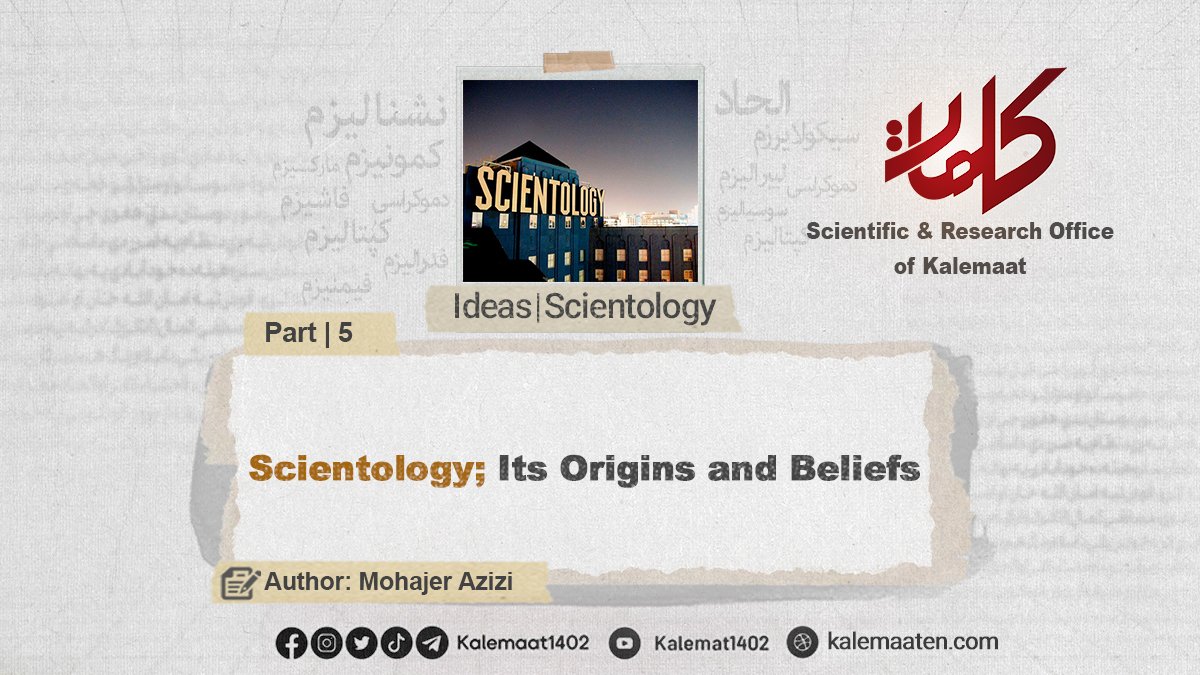Author: Mohajer Azizi
Scientology; Its Origins and Beliefs (Part five)
Islam and Mental Health
Islam, as a complete and comprehensive religion, has paid full attention to all aspects of human life. Its teachings are not limited to acts of worship and morality, but also provide special guidance and emphasis on the health of the human mind and soul. No religion or ideology, unlike Islam, has ever been able to present such accurate, practical, and salvific principles regarding mental and spiritual well-being.
For instance, Scientology claims to purify the mind and spirit and lead humans to eternal happiness, yet it has produced no real outcomes. Despite having its headquarters in the United States, a large number of Americans still suffer from mental health problems such as depression and anxiety. Why has Scientology failed to heal them from these serious problems? The reason is clear—it is merely a set of theories and advertisements, not a genuine solution.
In the teachings of Islam, sadness, anxiety, and depression are recognized as part of human experience; however, Islam also provides effective spiritual and practical means for coping with them. By applying these means, one can surely attain psychological health and inner joy.
Below, we will examine some of the most important Islamic principles related to mental health and the alleviation of sorrow, anxiety, and depression:
-
Reliance and Trust in Allah (Tawakkul)
Trusting in Allah is one of the key foundations of mental and spiritual peace. The happiest and most content people in the world are those who rely on Allah; on the contrary, the saddest and most depressed are those who lack such trust.
Allah the Almighty says: “وَمَن يَتَوَكَّلْ عَلَى اللّٰهِ فَهُوَ حَسْبُهُ” Translation: “And whoever relies upon Allah, He is sufficient for him.” [At-Talaq: 3]
This verse shows that when a person depends upon Allah and firmly believes that all affairs are in His hands and nothing occurs without His will, he becomes free from the burden of worry and anxiety and ultimately attains inner peace.
Tawakkul does not mean abandoning worldly means; rather, it means utilizing available means while placing one’s true trust in Allah — since no means can succeed without His will.
Believers are the happiest and most mentally sound people because they have faith in their Almighty Creator and turn to Him in every hardship. They accept divine decree with patience and submission, which brings them comfort and peace of mind.
On the other hand, followers of false doctrines, including Scientology, do not know what Tawakkul is because they have distanced themselves from the true and all-powerful God. When they become anxious or depressed, they turn to therapy sessions or antidepressants, forgetting that true tranquility lies in the remembrance of Allah — not in pills, alcohol, or drugs. That is why disbelievers suffer most from mental and emotional distress.
-
Remembrance and Worship as Sources of Spiritual Peace
Another key to mental health in Islam is Dhikr — the remembrance of Allah. Nothing soothes the heart and mind like remembering Allah. Dhikr and the recitation of the Qur’an are the best cures for sorrow, anxiety, and depression. Whoever regularly recites the Qur’an will never be overtaken by such illnesses. Indeed, the happiest people on earth are those who engage in remembrance and recitation.
The Qur’an explicitly declares: “أَلَا بِذِكْرِ اللّٰهِ تَطْمَئِنُّ الْقُلُوبُ” Translation: “Verily, in the remembrance of Allah do hearts find peace.” [Ar-Ra‘d: 28]
Prayer, supplication, Qur’an recitation, seeking forgiveness, and glorifying Allah are all means that remove negative thoughts and lead to spiritual serenity. Many modern psychological researchers have also confirmed the positive effects of regular worship and remembrance of God in reducing anxiety and depression.
Conversely, neglecting the remembrance of Allah leads to a difficult and distressing life. Allah says: “وَمَنْ أَعْرَضَ عَنْ ذِكْرِي فَإِنَّ لَهُ مَعِيشَةً ضَنْكًا وَنَحْشُرُهُ يَوْمَ الْقِيَامَةِ أَعْمَى” Translation: “And whoever turns away from My remembrance, indeed, for him is a depressed life, and We will raise him blind on the Day of Resurrection.” [Taha: 124]
-
Positive Outlook and Gratitude
A positive outlook and gratitude are two essential factors for achieving mental and spiritual well-being. Islam teaches its followers to remain grateful even in times of hardship and to acknowledge the blessings of Allah, both visible and hidden. Ingratitude and impatience cause mental imbalance and deprive one of divine blessings.
The Messenger of Allah (PBUH) said: “وَعَنْ أَبِي يَحْيَى صُهَيْبِ بْنِ سِنَانٍ قَالَ: قَالَ رَسُولُ اللهِ ﷺ: عَجَبًا لِأَمْرِ الْمُؤْمِنِ، إِنَّ أَمْرَهُ كُلَّهُ لَهُ خَيْرٌ، وَلَيْسَ ذَاكَ لِأَحَدٍ إِلَّا لِلْمُؤْمِنِ: إِنْ أَصَابَتْهُ سَرَّاءُ شَكَرَ فَكَانَ خَيْرًا لَهُ، وَإِنْ أَصَابَتْهُ ضَرَّاءُ صَبَرَ فَكَانَ خَيْرًا لَهُ.” Translation: “How wonderful is the affair of the believer! There is good for him in everything—and this is for no one except the believer. If he is blessed with prosperity, he thanks Allah, and that is good for him; and if adversity befalls him, he is patient, and that is also good for him.” [Sahih Muslim, No. 2999]
This Hadith highlights gratitude and patience as two keys to peace and goodness. Life is full of ups and downs—sometimes joyful, sometimes painful—but a believer who remains thankful in ease and patient in hardship attains both worldly success and inner tranquility.
Thus, Islam provides the best psychological and spiritual solutions for mental health—solutions far more effective and authentic than those offered by modern ideologies such as Scientology.
Previous Part/ Next Part
Continues…
References:
[1] At-Talaq: 3
[2] Tafseer Ma’ariful Qur’an, Vol. 14, p. 88
[3] Ar-Ra‘d: 28
[4] Taha: 124
[5] Sahih Muslim, No. 2999



